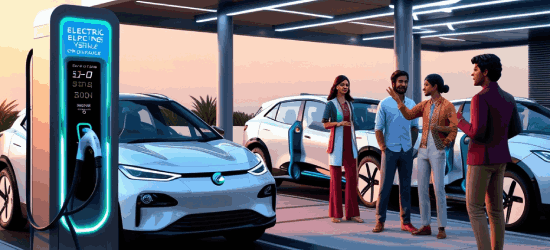Scaling up e-mobility in India hinges on private investment and policy reforms, say experts

By Team Indoen
Posted on 17 Feb 2025
Tags: EV Reporter's Desk
India’s push toward an electric mobility revolution will require substantial private investment, robust policy backing, and integrated infrastructure solutions, industry leaders stressed at a high-profile discussion on e-mobility in emerging economies.
Speaking at a panel on "Establishing Transformative,
Integrated E-Mobility Ecosystems in Emerging Economies,” in the recently concluded
India Energy Week 2025 top executives from the energy and mobility sectors
underlined that while India has made strides in e-mobility adoption, sustained
growth will hinge on addressing infrastructure and financial hurdles.
Vishal Kapoor, CEO of Energy Efficiency Services Limited
(EESL), highlighted the scale of investment needed to support the transition.
“One major hurdle is the installation of distribution transformers and capacity
augmentation. Currently, with a limited number of EVs, this is manageable, but
as the ecosystem grows, large-scale private sector investment—amounting to
several lakh crores—will be needed,” he said.
The Indian government has implemented multiple policies,
such as the Faster Adoption and Manufacturing of Electric Vehicles (FAME)
scheme, aimed at encouraging e-mobility. However, experts argue that private
capital will be crucial in expanding charging networks and integrating
renewable energy into transportation.
Dr Shailendra Shukla, Managing Director of Eaton’s Mobility
Group in India, pointed out the need for standardisation across vehicle
categories to streamline infrastructure development. “Public-private
partnerships will be instrumental in ensuring a smooth transition. We must
prioritise research and development, as the biggest expense in energy
transition will come from innovation,” he remarked.
Shukla also noted that LNG and hydrogen-powered vehicles
were prominently featured at the ongoing industry exhibition, underlining their
growing role in mobility solutions.
Technology integration and predictive analytics will also
play a key role in shaping India’s e-mobility landscape, noted Vignesh
Nandakumar, CEO Asia at Enfinity Global. “India's strong internet penetration
can enhance efficiency, but affordability remains a key factor in driving
widespread adoption,” he said, emphasising the need to incorporate AI-driven
models to predict energy demand effectively.
The conversation also touched on India’s evolving energy
security landscape. Sarthak Behuria, Chairman of the Board of Directors at
Reliance BP Mobility Ltd, reflected on how the country’s reliance on fossil
fuel imports has increased over the decades. “Fifty years ago, our dependence
on fossil fuel imports was below 50%. Today, it has significantly increased.
While we have built a robust infrastructure to ensure petroleum accessibility,
our challenge extends beyond energy security to energy transition,” he said.
Behuria noted that while fossil fuels will remain dominant
in the near term due to growing energy consumption, a gradual shift from CNG to
biogas and other alternative fuels is imperative.
Min Yih Tan, Senior Vice President of Mobility Asia at
Shell, laid out three key factors that will determine e-mobility success:
availability, reliability, and investment viability. “Scaling up demand and
consumption will make supply a critical factor in ensuring a successful
mobility transition. We also need to focus on capability-building and
developing skilled human resources,” he noted.
While India Energy Week 2025 served as a backdrop for these discussions, the emphasis on e-mobility aligns with India’s broader energy transition goals. With the government aiming for a significant reduction in carbon emissions by 2030 and a shift toward cleaner energy sources, the insights from industry leaders reinforce the urgency of mobilizing private investment and fostering technological innovation to accelerate EV adoption in the country.
Kindly follow us for updates on:
- Strategic Pathways For India’s Green Mobility
- India to cap investment in EV charging for tariff relief as Tesla entry...
- Centre likely to modify new EV policy as Tesla gears up to enter India
- India's EV push needs high-speed trains ... China's adoption rate
- India's EV incentive plan finds no takers-government weighs fix
- Why Tesla’s entry is unlikely to disrupt India’s retail EV market
- India emerges as a global R&D hub for oil & gas giants at IEW 2025
- India's natural gas consumption set to surge 60% by 2030
- India leads global dialogue on clean cooking at energy week 2025
- PM Modi: Energy reforms to drive India’s growth and sustainability